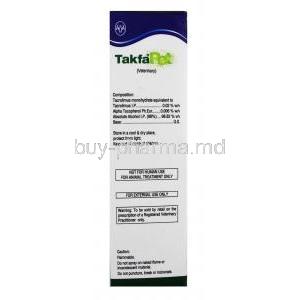Takfa Pet
- I. Introduction
- II. Composition
- III. Uses
- IV. Off-Label Use
- V. How It Works
- VI. Dosage and Administration
- VII. Common Side Effects
- VIII. Serious Side Effects and Adverse Reactions
- IX. Interaction
- X. Warning
- XI. Contraindication
- XII. Careful Administration
- XIII. Important Precautions
- XIV. Administration to Elderly Animals
- XV. Administration to Pregnant Women and Nursing Mothers
- XVI. Administration to Children (Young Animals)
- XVII. Overdosage
- XVIII. Handling Precautions
- XIX. Storage
I. Introduction
The introduction of Takfa Pet has brought about an era in veterinary medicine offering hope, for pets suffering from different ailments. This article explores the essence of Takfa Pet, a pharmaceutical innovation that plays a vital role in improving the health and well-being of animals.
Overview of Takfa Pet
Takfa Pet is a crafted pharmaceutical product designed to effectively treat a wide range of health issues that our beloved animal friends may face. Its unique formulation, consisting of a combination of active components, highlights its effectiveness and adaptability within the field of veterinary medicine.
Significance in Veterinary Medicine
The importance of Takfa Pet in the field of medicine cannot be emphasized enough. It signifies an advancement in the treatment and care of animal health problems, providing veterinarians with a powerful resource in their medical toolkit.
II. Composition
Active Ingredients
The effectiveness of Takfa Pet relies on its components, which play a crucial role in providing therapeutic benefits. These compounds work pharmacologically to alleviate symptoms and address the root causes of conditions.
- Active Ingredients:
- Tacrolimus: 0.02% w/v
- Alpha tocopherol: 0.06% w/v

III. Uses
Primary Indications in Veterinary Medicine
-
Management of Inflammatory Conditions:
- Takfa Pet Spray is indicated for the management and treatment of canine atopic dermatitis. It helps alleviate the discomfort associated with allergic skin reactions1.
-
Treatment of Specific Dermatological Issues:
-
Alleviation of Chronic Pain Syndromes:
Scope of Application in Different Animal Species
Takfa Pets versatility covers a range of animal species, including commonly kept pets like dogs and cats as well as more unique animals. This highlights how adaptable and widely applicable it is in practice.
IV. Off-Label Use
Exploring the Extended Applications Beyond Official Approval
While Takfa Pet Spray is primarily indicated for the management of canine atopic dermatitis, perianal fistula, and pododermatitis of allergic origin, there are instances where it may be used off-label. Veterinarians sometimes prescribe medications for purposes other than their officially approved indications. Here are some potential off-label uses:
-
Chronic Pain Management:
- Although not explicitly mentioned in the official indications, Takfa Pet Spray’s anti-inflammatory properties may help alleviate chronic pain associated with various skin conditions.
-
Other Dermatological Conditions:
- Veterinarians may consider using Takfa Pet Spray for other dermatological issues beyond the specified indications. However, this should always be done under professional guidance.
Case Studies and Veterinarian Recommendations
Based on evidence and case studies, there is strong support for the effectiveness of Takfa Pet in these unconventional uses. This provides a source of information for veterinary professionals who are interested in exploring alternative treatment options.
V. How It Works
Mechanism of Action
The way Takfa Pet works showcases the brilliance of science. It focuses on addressing the underlying issues at a level aiming to restore the animal's health and balance.
Impact on Animal Physiology
The effects of Takfa Pet on the well-being of animals are diverse, providing both relief from symptoms and a potential cure for various illnesses. Consequently, it enhances the quality of life for our beloved animal companions.
VI. Dosage and Administration
Dosage Guidelines for Various Animal Species
The dosage schedule for Takfa Pet is carefully adjusted to meet the physiological characteristics of different animal species, guaranteeing the best possible treatment effectiveness while reducing any potential side effects.
Methods of Administration
Takfa Pet has the advantage of being available in forms such as oral, topical, and injectable options. This versatility allows for tailored administration based on the requirements and preferences of different animal species.
Adjustments for Age, Weight, and Health Condition
It is crucial to make adjustments to the dosage of medication considering factors such as age, weight, and the overall health condition of each patient. This personalized approach helps optimize the effectiveness of the treatment and improves results.
VII. Common Side Effects
Overview of Frequently Observed Side Effects
Takfa Pets' pharmacological abilities, although helpful, can sometimes result in unwanted effects. However, these effects are usually temporary. It can be easily managed. It highlights the significance of monitoring the treatment process.

Managing Mild Adverse Reactions
Mild side effects can usually be controlled by adjusting the dosage or providing treatment. This helps to maintain the patient well being while still ensuring that the therapy remains effective.
VIII. Serious Side Effects and Adverse Reactions
Identifying Severe Reactions
In a few cases when pets have severe reactions to Takfa, it is crucial to seek immediate veterinary assistance. Being able to identify the indications of these reactions is essential for efficient treatment.
Immediate Steps and Veterinary Interventions
If a severe adverse reaction occurs the first thing to do is to stop giving Takfa Pet. Then, it's important to take medical measures to minimize the effects and protect the animals well well-being.
IX. Interaction
Drug-Drug Interactions
It is crucial to have an understanding of the complex interconnections between different drugs and how they can affect each other. When using Takfa Pet alongside medications it is possible that there may be interactions in terms of how the drugs are processed in the body and how they exert their effects. These interactions might require modifications to the treatment plans.
Food and Supplement Interactions
Changes in the components and dietary supplements can affect how effective Takfa Pet is and how much of it is available to the body. It's important to inform caregivers about the possibility of these interactions and help them with dietary adjustments while undergoing treatment.
Impact on Diagnostic Tests
The use of Takfa Pet medication could potentially affect the results of diagnostic tests. It is important for veterinary professionals to be aware of these interferences, in order to accurately interpret the test outcomes.
X. Warning
Situations Requiring Caution
- Please exercise caution when using this with animals that have a history of reactions.
- Take into account the balance between risks and benefits for patients who already have kidney or liver conditions.
Environmental and Handling Warnings
It is crucial for caregivers to prioritize stewardship and follow safe handling practices in order to reduce the risk of exposure and protect the integrity of the ecosystem.
XI. Contraindication
Absolute Contraindications
Takfa Pet should not be used in animals who have a known sensitivity, to any of its ingredients as this could lead to harmful reactions.
Relative Contraindications
In some situations, it may be necessary to be careful when using Takfa Pet, especially if someone already has liver or kidney diseases. In these cases, it is important to think about whether or not to administer it.
XII. Careful Administration
Special Considerations for Sensitive Groups
Certain groups of individuals, including newborns, elderly patients, and those with health conditions, need customized approaches for dosing medications and additional monitoring to achieve the best treatment results while minimizing potential risks.
Monitoring Requirements
It is crucial to assess how well the treatment is working and keep a close eye on any potential negative effects when administering Takfa Pet. This approach ensures that the treatment remains safe and effective.
XIII. Important Precautions
Pre-Treatment Assessments
Before starting treatment, with Takfa Pet, it is crucial to conduct diagnostic assessments to identify any underlying conditions that could potentially affect the decisions regarding treatment.

Ongoing Monitoring and Evaluation
Monitoring the progress of your pet's treatment with Takfa Pet is crucial. This involves evaluating how effective the therapy is and promptly identifying any adverse reactions that may arise, allowing for timely interventions to be implemented.
XIV. Administration to Elderly Animals
Adjusting Dosage and Monitoring for Geriatric Patients
Elderly patients, due to changes in how their bodies process medications and their higher vulnerability to side effects from drugs, require dosage modifications and vigilant monitoring to guarantee both the effectiveness and safety of the treatment.
Common Concerns and Precautions
As people get older, their physical changes can make them more susceptible to reactions. It's crucial to consider the overall health of elderly patients when administering Takfa Pet.
XV. Administration to Pregnant Women and Nursing Mothers
Safety Profile for Use in Pregnancy and Lactation
The safety of Takfa Pet, during pregnancy and breastfeeding has not been definitively determined. Therefore it is important to consider the potential risks and benefits before using it.
Recommendations and Alternatives
If there is a need to use Takfa Pet, it is important to consider treatment options or make changes to the dosage plan to minimize any potential risks to the unborn baby or nursing child.
XVI. Administration to Children (Young Animals)
Dosage Adjustments for Pediatric Patients
When it comes to giving medications to children, it's important to strike a balance between effectiveness and safety. Adjusting the dosage for patients depends on factors like their stage of development, weight, and specific health conditions. These adjustments are crucial to avoid giving too little medication, which could result in the treatment not working, or giving too much medication, which could lead to unwanted side effects.
Safety and Efficacy Considerations
Ensuring the safety and effectiveness of treatments for children is at the heart of care. It is crucial to evaluate and use medications, giving preference to those that have been thoroughly studied and proven effective in young animals. Close monitoring for any effects is essential, and treatment protocols should be adjusted based on the changing clinical response.
XVII. Overdosage
Signs and Symptoms of Overdose
- Feeling excessively sleepy Feeling confused and having trouble coordinating movements
- Experiencing stomach problems, like vomiting and diarrhea
- Recognizing these symptoms calls for immediate action to prevent any potential harm.
Emergency Management and Antidotes
If an overdose occurs, it is essential to seek veterinary assistance. This may involve taking steps to remove any substances, providing support for symptoms, and administering specific antidotes if they are accessible. Ensuring access to care can greatly improve the outcome after an overdose.
XVIII. Handling Precautions
Safe Handling Practices for Owners and Veterinarians
It is crucial to follow safety measures to avoid any unintentional contact with medications. Both pet owners and veterinarians should strictly adhere to the guidelines for handling, administering, and storing medications. This ensures the safety of both humans' and animals' well-being.
Disposal of Unused Medication
Disposing of unused or expired medication is crucial to avoid environmental pollution and accidental ingestion by unintended individuals. It is essential to follow guidelines, for disposal, which highlight the significance of returning unused medications to veterinary clinics or pharmacies that are equipped to handle them correctly.
XIX. Storage
Recommended Storage Conditions
It is crucial to store medications under the conditions to maintain their quality and effectiveness. To prevent deterioration and prolong their shelf life, it is recommended to store medications in a dry location away from direct sunlight and extreme temperatures.

Shelf Life and Stability
The expiration date of medications indicates the duration in which the product remains both effective and safe, for use. It is important to comprehend and adhere to these dates to ensure that treatments maintain their efficacy and safety.








